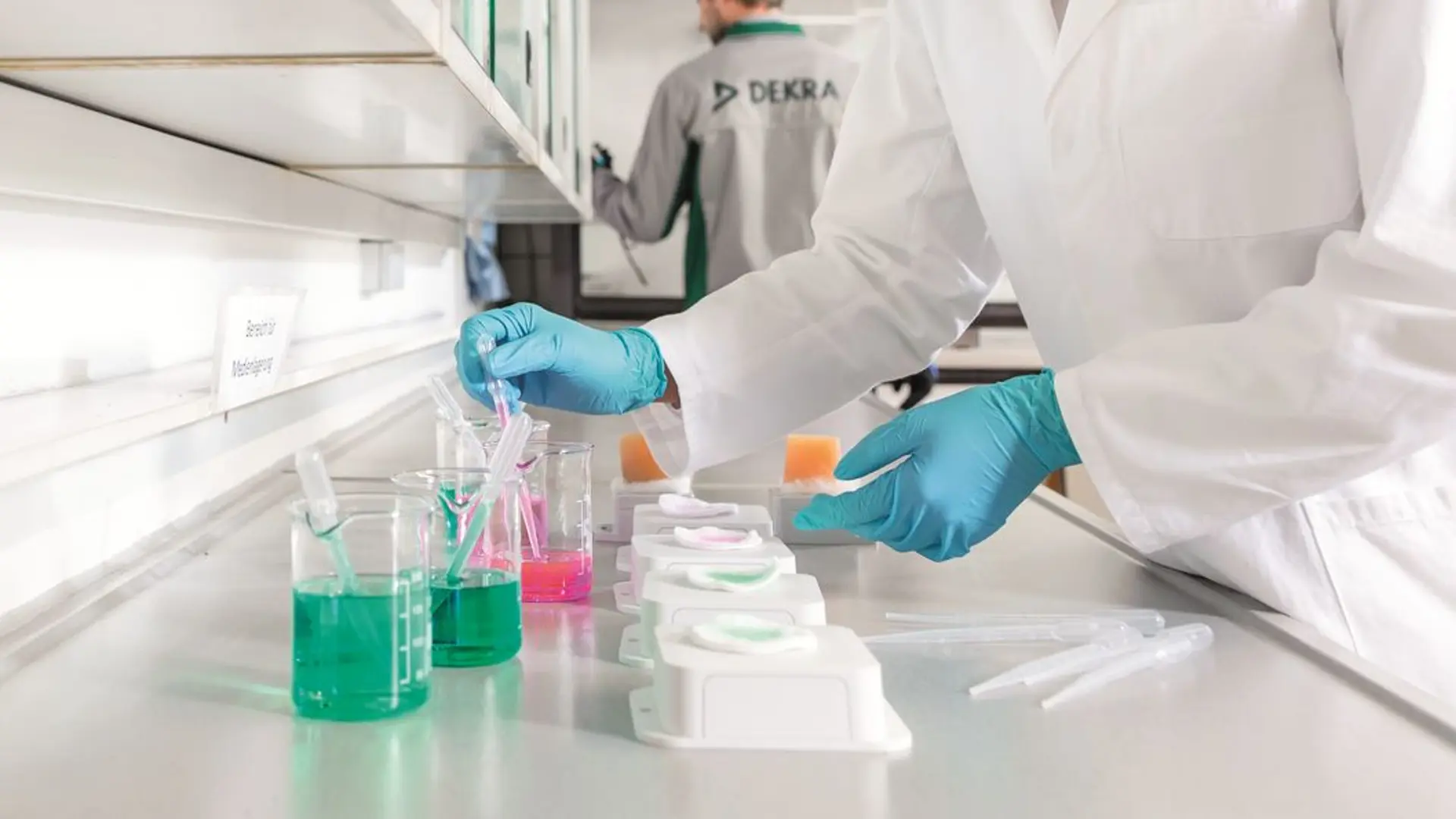
Laboratory sites DEKRA Automobil GmbH, Germany
Kontaktdaten
Handwerkstr. 17
70565 Stuttgart
Chemical safety testing services
Monitoring of chemical safety is essential in the manufacture of consumer goods. Compliance with international chemical regulations such as RoHS and REACH, for food contact materials and customer specifications are often required. But hazardous substances also pose a risk at the workplace. Our accredited chemical laboratories offer comprehensive testing services and expertise.
Chemical analyses of pollutants for workplace measurements and dangerous goods testing for classification according to the UN Manual
Pollutants, mixtures of substances, dusts, fibres, gases, aerosols and vapours can represent a problem in the air at workplaces, even to the point of exceeding workplace limit values. DEKRA offers you comprehensive chemical laboratory services for your required workplace measurements. Also to ensure transport safety and the correct handling of dangerous goods, we support you with laboratory tests for the classification of substances, mixtures, products and waste according to the UN Manual on the Transport of Dangerous Goods.
Your benefits from hazardous substances analyses and dangerous goods testing at DEKRA
- accredited laboratory analyses of workplace air quality with quartz, dusts, organic compounds, heavy metals and other hazardous substances
- comprehensive testing options in accordance with the UN Manual of Tests and Criteria
- physico-chemical analyses for the determination of characteristic data and the preparation of safety data sheets
- fast and reliable results
The correct classification of goods into the respective dangerous goods class is based on special classification and testing procedures recommended in the United Nations (UN) Manual of Tests and Criteria for the Transport of Dangerous Goods. Our laboratory experts determine the physical-chemical substance data you need for safety assessment and transport classification for ADR, RID, IMDG and IATA.
At the workplace, too, many employees regularly come into contact with pollutants, dusts, gases, aerosols or vapours for which obligatory limit values apply and which you as an employer must comply with. It is therefore important to identify and avoid hazardous substances and the resulting potential risks at an early stage. As an accredited testing laboratory according to DIN EN ISO/IEC 17025, we support you with reliable chemical analyses. In particular, knowledge of the explosion characteristics of dusts is important for the safe handling of these substances. DEKRA also determines relevant values for explosion protection measures.
Laboratory tests to determine substance characteristics according to the UN Manual - our test scope
For classes 2, 3, 4.1, 4.2, 4.3, 5.1, 8 and 9, we examine the following characteristics:
- penetrometer test for the classification solid/liquid
- flash point
- solvent separation test (UN Test L.1)
- sustained combustibility test (UN Test L.2)
- flammable solids - burning rate test (UN Test N.1)
- pyrophoric solids / liquids (UN Test N.2 / N.3)
- self-heating substances (UN Test N.4)
- rate of gas emission (UN Test N.5)
- oxidizing solids (UN Test O.1) and liquids (UN O.2)
- corrosion to metals (UN Test C.1)
- screening test for harmful substances after with regard to environmental hazards
Further process safety testing services for explosive properties (class 1) and self-reactive properties by DEKRA in Southampton, UK:
https://www.dekra-uk.co.uk/en/process-safety-overview/
Our analytical spectrum for workplace measurements includes
- alveolar and inhalable dust fraction
- quartz dust / crystalline silica in alveolar dust such as quartz, cristobalite, tridymite (quartz analysis by FTIR / PXRD)
- asbestos fibres and other inorganic carcinogenic fibre dusts
- halogenes & halogenated hydrogens
- inorganic acids
- diesel engine exhaust emissions (DEEE)
- metals / heavy metals
- non metal oxides
- solvents (VOC) by GC-MS / GC-FID
- cooling lubricants
- PAH
- amines
- isocyanate
- siloxanes
Organic substances and VOC analyses also contain acrylates, alkanes, alkenes, alcohols, aldehydes, aromatics, chlorinated hydrocarbons, epoxides, esters and glycol acetates, glycols, ketones, phenols, terpenes and many more.
We will be happy to provide you with an individual offer.